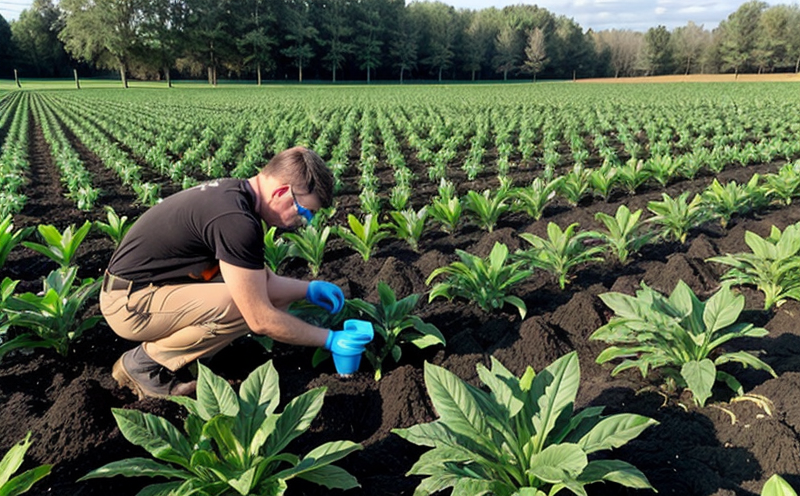Silicon Content Testing in Fertilizers
Testing silicon content in fertilizers is a critical process that ensures agricultural productivity and supports sustainable farming practices. Silicon, although not directly involved in photosynthesis like nitrogen or carbon dioxide, plays a pivotal role in plant health by enhancing root growth and resistance to diseases and pests. This makes it an essential micronutrient for optimal crop yield.
The process of silicon content testing involves several steps that are crucial for accurate results. The first step is the proper sampling of fertilizer samples which should be representative of the batch being tested. Sampling techniques can vary based on the type of fertilizer, but they must ensure that the sample reflects the overall composition accurately. After collection, these samples undergo rigorous preparation to remove any contaminants that might interfere with the test.
Once prepared, fertilizers are analyzed using advanced analytical instruments such as Inductively Coupled Plasma Mass Spectrometry (ICP-MS) or X-ray Fluorescence (XRF). These methods provide precise measurements of silicon content. The precision and accuracy of these tests directly impact the reliability of the results. Compliance with international standards like ISO 17346 ensures that the testing procedures follow best practices.
The importance of this test extends beyond just compliance; it also aids in optimizing fertilizer application rates, which can lead to cost savings for farmers while enhancing crop quality and environmental sustainability. By accurately determining silicon content, agricultural experts can tailor fertilizers specifically tailored to meet the needs of different crops and soil types, thereby improving overall agricultural efficiency.
Additionally, regular monitoring through silicon content testing helps in identifying any deviations from expected standards early on. This proactive approach allows for timely interventions if issues arise, ensuring that crops receive the right nutrients at the right time. In essence, this testing service is not just about checking compliance but also about driving innovation and sustainability within the agricultural sector.
Benefits
- Precise measurement of silicon content ensures proper nutrient application rates.
- Supports compliance with international standards like ISO 17346 and ASTM D5088.
- Aids in optimizing fertilizer use, which can lead to cost savings for farmers.
- Helps identify any deviations from expected standards early on, allowing for timely interventions.
- Improves crop quality by ensuring that crops receive the right nutrients at the right time.
- Promotes sustainable farming practices through efficient resource utilization.
Quality and Reliability Assurance
The reliability of silicon content testing is paramount for maintaining high standards in agriculture. Our laboratory uses state-of-the-art equipment and adheres strictly to established protocols, ensuring that all tests are conducted under controlled conditions. Regular calibration of instruments ensures accuracy and consistency in results.
We employ highly trained technicians who not only perform the tests but also interpret them correctly, providing actionable insights for stakeholders. This comprehensive approach guarantees that every step from sample collection to final report is meticulously documented and reviewed. Compliance with international standards such as ISO 17346 ensures that our services meet global benchmarks.
Our commitment to quality extends beyond just adhering to regulations; we strive to exceed expectations by offering reliable, accurate results promptly. By leveraging cutting-edge technology and experienced personnel, we ensure that each test is conducted with utmost precision and care, contributing significantly towards maintaining the integrity of agricultural practices worldwide.
Environmental and Sustainability Contributions
The importance of sustainable farming cannot be overstated in today's world. Proper silicon content testing plays a crucial role in achieving this goal by helping farmers apply fertilizers more efficiently, thus minimizing waste and reducing environmental impact.
By accurately measuring the amount of silicon present in fertilizers, we can help prevent over-fertilization which is one of the leading causes of water pollution. Excessive amounts of nitrogen and other nutrients from fertilizers often end up in nearby water bodies through runoff or leaching, causing harmful algal blooms and depleting oxygen levels in aquatic ecosystems.
Through precise measurement and application of silicon content, we aim to reduce such instances significantly. This not only helps protect natural resources but also contributes positively towards achieving the United Nations' Sustainable Development Goals (SDGs), particularly Goal 15 which focuses on life on land and ensuring healthy ecosystems.
In conclusion, our services go beyond just providing test results; they play an integral part in promoting a more sustainable approach to agriculture. By focusing on efficient use of resources, we contribute towards creating a healthier planet for future generations.
Frequently Asked Questions
- Ensures proper nutrient application, leading to enhanced crop yields.
- Aids in compliance with international standards and local regulations.
- Supports sustainable farming practices by optimizing resource use.





